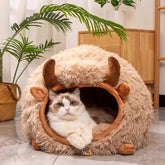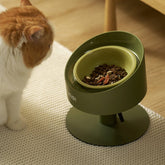Do Cats Need Dental Care?

The answer to this question is simple: Cats need dental care as much as dogs and people do.
Cleaning your cat's teeth regularly is one of the best ways to help prevent a whole host of health issues down the road. If cats don't receive regular cleanings, plaque can build up on their teeth, which can eventually harden into tartar. Tartar can contribute to serious oral problems like gum disease, also called gingivitis.
Dental disease is a reality for most cats. Gingivitis and periodontal disease are serious but slow-progressing diseases that affect the overall health and wellbeing of your cat. At age four, many cats have significant gingivitis and many also have periodontal disease. These diseases cause pain in cats and can make it difficult for them to eat or drink.
Although cats will not show signs of discomfort, dental problems can slowly develop over time and cause pain. Because cats cannot tell us when they are in pain, it is important to be aware of the signs.
Let's look at the causes of dental problem in cats
What Are The Causes Of Dental Problem In Cats
Dental disease in cats is common, affecting both young and old cats. Up to 85% of cats 3 years and older have dental disease. Most dental problems in cats can be prevented or treated with early intervention.
Dental disease in cats is usually caused by a buildup of bacteria. Bacterial growth that is not stopped can cause periodontal disease in cats, affecting both teeth and gums.
What Is Dental Plaque and Tartar in Cats?
Plaque is a layer of bacteria that forms on teeth. If it is not removed, it grows thicker. It is seen as a white layer on the tooth surface and is the most common cause of dental disease in cats. Plaque hardens over time due to calcium deposits and becomes dental tartar or calculus - a hard, yellow or brown deposit on the tooth surface that can only be removed by a professional.
Brushing your cat’s teeth daily is recommended to keep their gums healthy and prevent plaque buildup. If your cat already has plaque buildup, you'll need to take them to a vet for dental scaling to remove the tartar.
What Is Gum Disease in Cats?

Feline gum disease, also known as gingivitis, is a condition in which the gums around your cat's teeth become swollen or inflamed. Gingivitis is painful and is caused by a buildup of plaque or bacteria on the teeth. If the plaque grows, bacteria can infect the gums at the tooth's base. The cat's immune system will then start attacking the bacteria, causing inflammation, redness, and pain.
Periodontal disease, or gum disease, is an infection caused by bacteria within the mouth that irritates and damages the surrounding tissue of teeth. It is most often caused by plaque, a build-up of food particles and bacteria along your cat's gum line.
How To Spot Dental Issues in Cats
There are a few different symptoms that may indicate your cat has dental disease, depending on the severity of the condition.
However, any of the following signs are worth paying attention to:
- Bad breath
- Has Yellow or brown deposits on the teeth or visible tartar
- Loosing teeth
- Gums that are red, swollen, or bleed easily
- Decreased appetite
- Have difficulty eating
- Loosing weight
- Excessive drooling
- Pawing at their teeth or mouth
If you notice any of the above signs of dental disease in your cat, it's important for them to have an examination as soon as possible. The sooner dental disease is diagnosed and treated, the better it will be for your cat's long-term health.
Common Cat Dental Diseases
Let's take a closer look at three of the most common oral health conditions that can affect your cat as they age.
Periodontal Disease

Did you know that approximately 70% of all cats will develop periodontal disease by the time they're 3 years old? This disease is caused by bacteria found in plaque, which is the soft film of bacteria and food debris that builds up on teeth over time. If plaque isn't regularly brushed away or cleaned, it will harden and form tartar that extends below the gum line.
When bacteria gets trapped below your cat's gum line and against their teeth, it will begin to irritate and erode the structures supporting your kitty's teeth. If untreated, periodontal disease will cause severe infection of your cat's gums, loose and missing teeth, and organ damage as the bacteria travels throughout your pet's body.
Feline stomatitis
This is an incredibly painful inflammation and ulceration—opening of sores—of your cat's gums, cheeks and tongue. Left untreated, stomatitis can cause your cat a great deal of pain and may lead to weight loss and refusal to eat.
Persians and Himalayans are more likely to develop stomatitis, but any cat can get it.
Cats with stomatitis are often in a lot of pain and have trouble eating. In some cases, they can become malnourished because it's so painful to eat. If your cat has a mild case, you might be able to treat it at home. But severe cases require surgery.
Tooth Resorption
Tooth resorption is a gradually destructive process that affects a tooth or multiple teeth in your cat's mouth. It's actually quite common in cats, with estimates of up to three-quarters of middle-aged and older cats suffering from it at some point.
When tooth resorption occurs, the body breaks down the hard outer layer of the tooth, loosening it and causing pain. This destruction happens below the gumline, so it can be tough to spot without a dental x-ray.
This destruction occurs below your cat's gumline so it can be challenging to detect without a dental x-ray. However, if you cat suddenly develops a preference for soft foods or swallows their food without chewing, they may be suffering from this condition.
This destruction occurs below your cat's gumline and can be difficult to detect without an x-ray. However, if your cat suddenly starts preferring soft foods or swallowing their food without chewing, they may have this condition.
Other tooth problems
such as tooth decay and enamel defects can also affect your cat’s teeth. Your cat may get into an accident or fight with other animals, leading to trauma, injury, or fractured teeth or jaw. If this happens, you'll have to visit the vet to stabilize your cat's fractured jaw or extract broken teeth
Preventing Dental Issues in Cats
The best way to keep your cat's teeth healthy is by brushing and cleaning them on a regular basis. This will help remove plaque before it can cause damage or infection.

To keep your kitty's teeth in top condition, bring them in for a professional dental examination and cleaning once a year. Dental appointments at Dunnellon Animal Hospital are like taking your kitty to the veterinary cat dentist.
To avoid oral health problems from developing, you should start cleaning your cat's teeth and gums while they are still a kitten. If your cat doesn't allow you to clean their teeth, dental treats and foods are also available to help you keep your cat's teeth healthy.
How to take care of cat’s dental health
It is recommended to take a proactive approach to feline dentistry by having your cat's teeth checked annually by a trained and experienced veterinarian. This is because dental issues that are spotted early on are much easier to address and resolve than those that go unnoticed and are allowed to further develop. As such, periodic dental checkups for your cat are essential in order to ensure their oral health.
You should brush your cat's teeth daily with specially designed brushes and feline hygiene products.
Cats generally don't mind if you brush their teeth, and it's actually really good for their dental health! By brushing their teeth daily, you can prevent tartar buildup, gum disease, and other problems. Brushing your cat's teeth on a daily basis (or at least twice a week) is the key to keeping their teeth and gums healthy. Some adult cats would resist to having their teeth cleaned, so it's a good idea to get them used to this process as early as possible. You can use a finger cot (a single 'glove finger') or a piece of gauze covered in toothpaste made for cats to ease your kitten into the experience. Covering your finger in the water from a can of tuna will also make the experience more pleasant for them.
Do not use human toothpaste as it contains high levels of fluoride which can make your cat severely ill if ingested. When brushing your cat’s teeth, use only a pea-sized amount of toothpaste on the toothbrush. It's important to avoid giving your cat fluoride toothpaste. Fluoride-free toothpaste designed for cats is available and is often flavored with beef or chicken.
You can brush your cat's teeth with sterilized gauze strips, a rubber toothbrush, or a finger brush that is designed specifically for cats. Cradle your cat from behind to make them feel comfortable and supported, gently tilt their head back, and lift up their chin to open their mouth and make it easy for you to access their teeth. Never use dental floss. It's a common household item that poses a severe danger to cats due to the risk of swallowing and intestinal damage.

Dental care for cats is essential and as a pet parent, you will need to take some proactive steps to ensure their mouth stays healthy - this is especially important if you want to avoid any costly dental procedures down the road. The good news is, it's easy to get your cat used to having their teeth cleaned from an early age with simple brushing techniques that can be done at home. Your veterinarian can also recommend and provide you with a variety of products, such as specially-formulated toothpaste and annual professional cleanings, which will help keep their teeth and gums in top condition and prevent the onset of dental disease.























